Food Scarcity: Analyzing Causes, Effects, and Potential Solutions
VerifiedAdded on 2023/06/03
|6
|1330
|254
Essay
AI Summary
This essay delves into the critical issue of global food scarcity, highlighting the environmental degradation caused by factors such as skewed investment policies and the widespread use of bottled water. It examines how these factors contribute to water pollution, soil degradation, and reduced agricultural productivity, leading to food shortages and increased risk of starvation for billions. The essay emphasizes the role of rich investors and corporations in exacerbating these problems, and discusses the impact on groundwater levels and river flows, particularly the Ganges. It calls for regulations to address the rational use of groundwater and the environmental impact of bottled water to ensure food security and sustainable agricultural practices. The analysis underscores the urgent need for policy changes and responsible investment to mitigate the crisis.
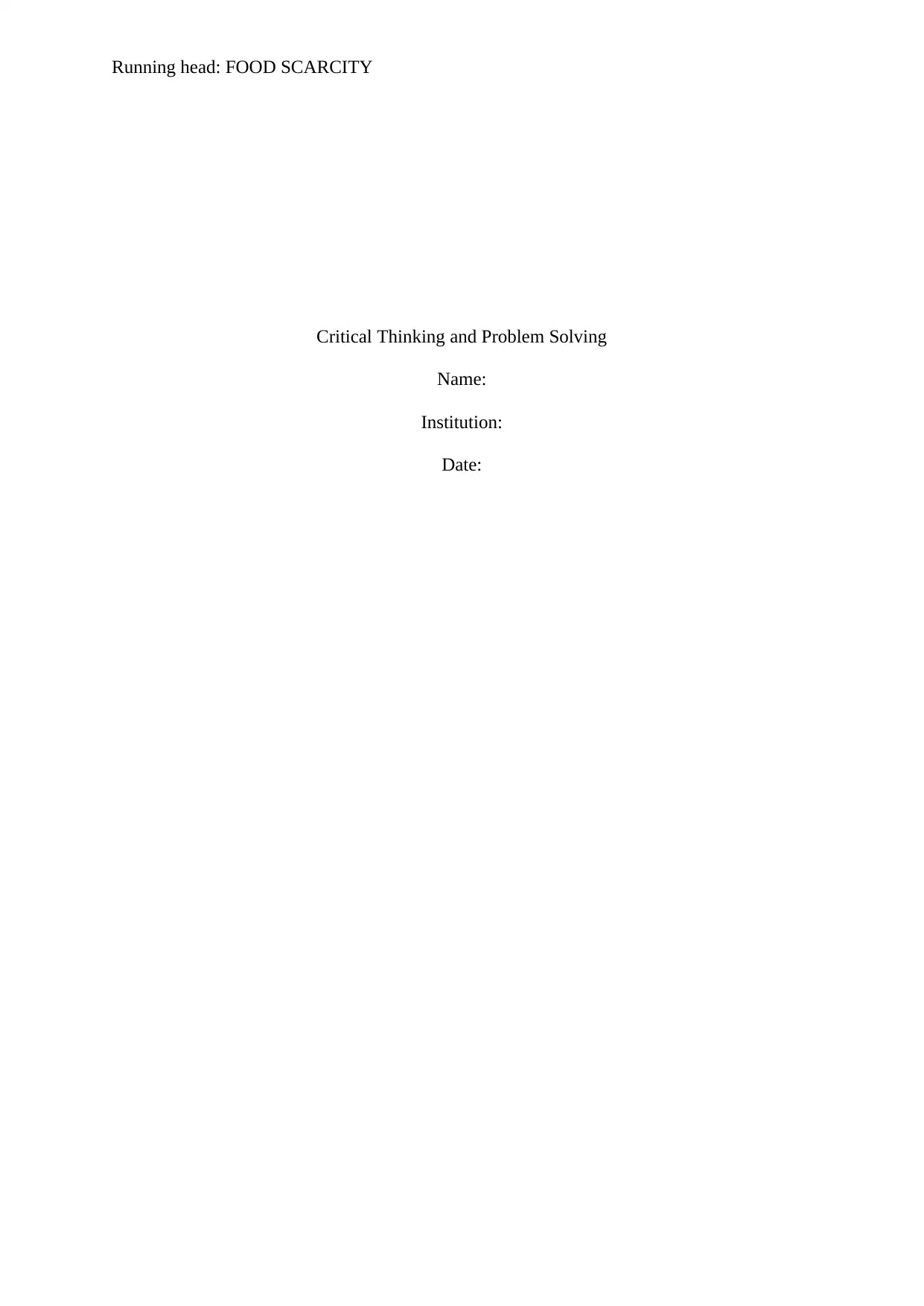
Running head: FOOD SCARCITY
Critical Thinking and Problem Solving
Name:
Institution:
Date:
Critical Thinking and Problem Solving
Name:
Institution:
Date:
Paraphrase This Document
Need a fresh take? Get an instant paraphrase of this document with our AI Paraphraser
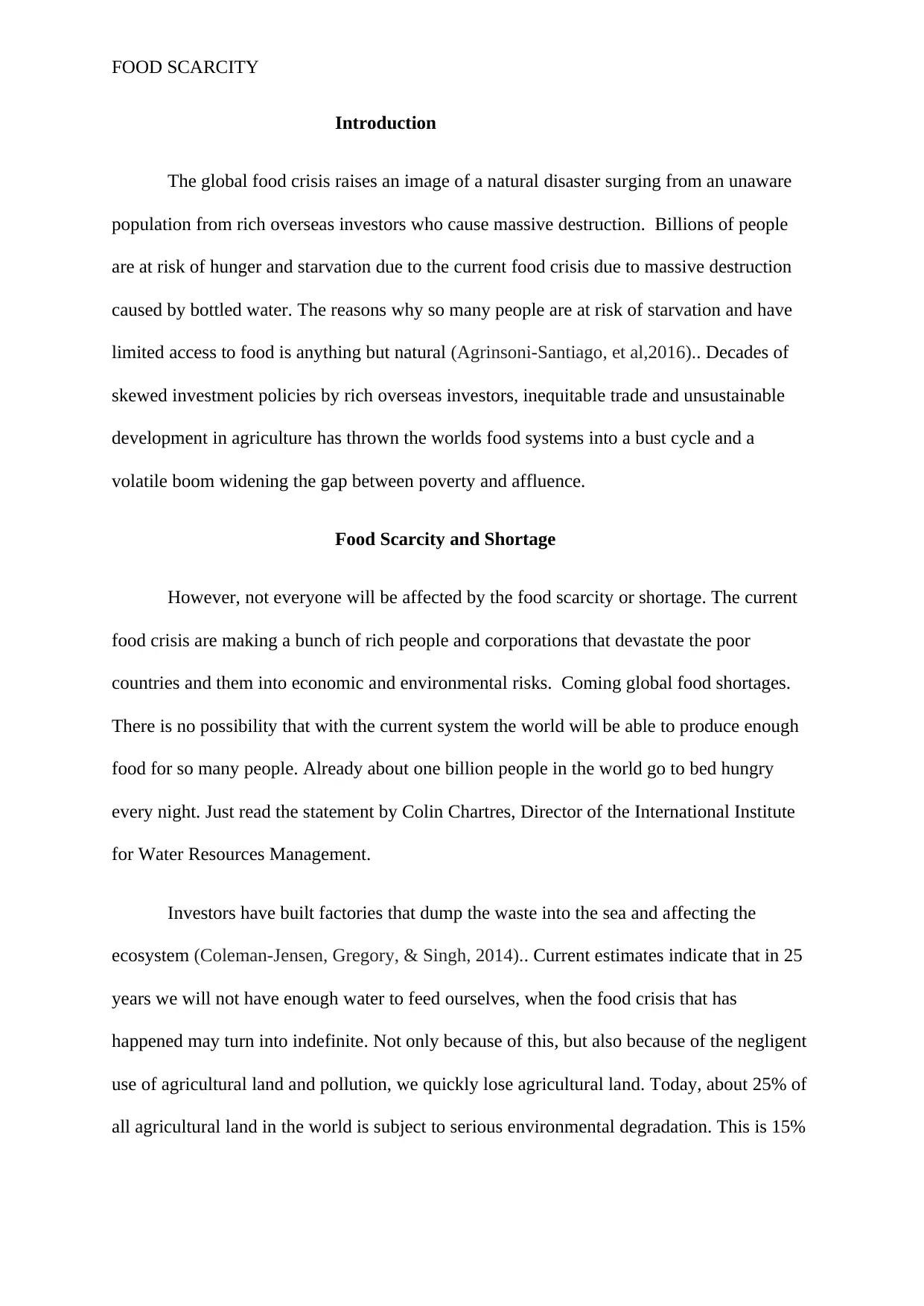
FOOD SCARCITY
Introduction
The global food crisis raises an image of a natural disaster surging from an unaware
population from rich overseas investors who cause massive destruction. Billions of people
are at risk of hunger and starvation due to the current food crisis due to massive destruction
caused by bottled water. The reasons why so many people are at risk of starvation and have
limited access to food is anything but natural (Agrinsoni-Santiago, et al,2016).. Decades of
skewed investment policies by rich overseas investors, inequitable trade and unsustainable
development in agriculture has thrown the worlds food systems into a bust cycle and a
volatile boom widening the gap between poverty and affluence.
Food Scarcity and Shortage
However, not everyone will be affected by the food scarcity or shortage. The current
food crisis are making a bunch of rich people and corporations that devastate the poor
countries and them into economic and environmental risks. Coming global food shortages.
There is no possibility that with the current system the world will be able to produce enough
food for so many people. Already about one billion people in the world go to bed hungry
every night. Just read the statement by Colin Chartres, Director of the International Institute
for Water Resources Management.
Investors have built factories that dump the waste into the sea and affecting the
ecosystem (Coleman-Jensen, Gregory, & Singh, 2014).. Current estimates indicate that in 25
years we will not have enough water to feed ourselves, when the food crisis that has
happened may turn into indefinite. Not only because of this, but also because of the negligent
use of agricultural land and pollution, we quickly lose agricultural land. Today, about 25% of
all agricultural land in the world is subject to serious environmental degradation. This is 15%
Introduction
The global food crisis raises an image of a natural disaster surging from an unaware
population from rich overseas investors who cause massive destruction. Billions of people
are at risk of hunger and starvation due to the current food crisis due to massive destruction
caused by bottled water. The reasons why so many people are at risk of starvation and have
limited access to food is anything but natural (Agrinsoni-Santiago, et al,2016).. Decades of
skewed investment policies by rich overseas investors, inequitable trade and unsustainable
development in agriculture has thrown the worlds food systems into a bust cycle and a
volatile boom widening the gap between poverty and affluence.
Food Scarcity and Shortage
However, not everyone will be affected by the food scarcity or shortage. The current
food crisis are making a bunch of rich people and corporations that devastate the poor
countries and them into economic and environmental risks. Coming global food shortages.
There is no possibility that with the current system the world will be able to produce enough
food for so many people. Already about one billion people in the world go to bed hungry
every night. Just read the statement by Colin Chartres, Director of the International Institute
for Water Resources Management.
Investors have built factories that dump the waste into the sea and affecting the
ecosystem (Coleman-Jensen, Gregory, & Singh, 2014).. Current estimates indicate that in 25
years we will not have enough water to feed ourselves, when the food crisis that has
happened may turn into indefinite. Not only because of this, but also because of the negligent
use of agricultural land and pollution, we quickly lose agricultural land. Today, about 25% of
all agricultural land in the world is subject to serious environmental degradation. This is 15%
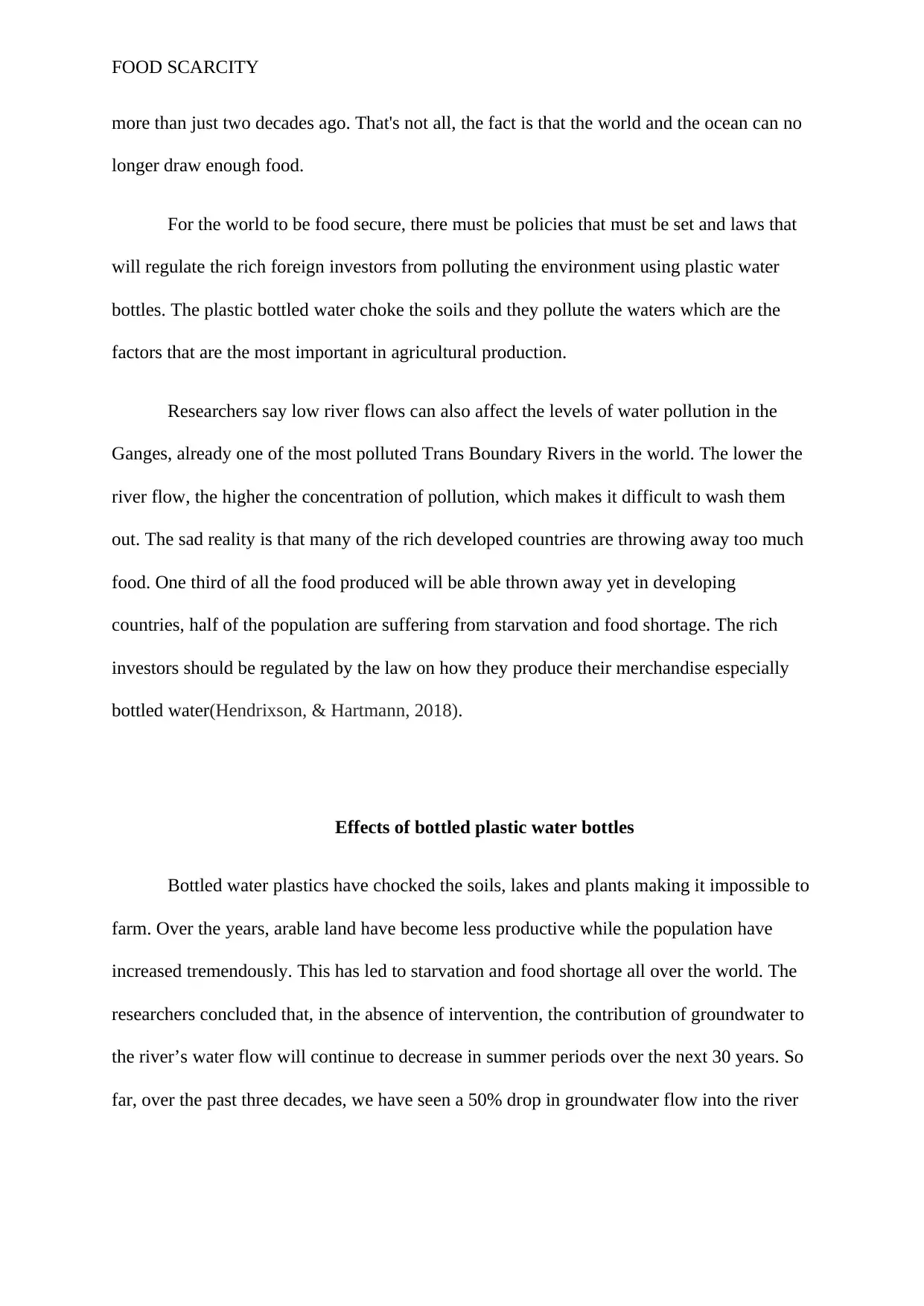
FOOD SCARCITY
more than just two decades ago. That's not all, the fact is that the world and the ocean can no
longer draw enough food.
For the world to be food secure, there must be policies that must be set and laws that
will regulate the rich foreign investors from polluting the environment using plastic water
bottles. The plastic bottled water choke the soils and they pollute the waters which are the
factors that are the most important in agricultural production.
Researchers say low river flows can also affect the levels of water pollution in the
Ganges, already one of the most polluted Trans Boundary Rivers in the world. The lower the
river flow, the higher the concentration of pollution, which makes it difficult to wash them
out. The sad reality is that many of the rich developed countries are throwing away too much
food. One third of all the food produced will be able thrown away yet in developing
countries, half of the population are suffering from starvation and food shortage. The rich
investors should be regulated by the law on how they produce their merchandise especially
bottled water(Hendrixson, & Hartmann, 2018).
Effects of bottled plastic water bottles
Bottled water plastics have chocked the soils, lakes and plants making it impossible to
farm. Over the years, arable land have become less productive while the population have
increased tremendously. This has led to starvation and food shortage all over the world. The
researchers concluded that, in the absence of intervention, the contribution of groundwater to
the river’s water flow will continue to decrease in summer periods over the next 30 years. So
far, over the past three decades, we have seen a 50% drop in groundwater flow into the river
more than just two decades ago. That's not all, the fact is that the world and the ocean can no
longer draw enough food.
For the world to be food secure, there must be policies that must be set and laws that
will regulate the rich foreign investors from polluting the environment using plastic water
bottles. The plastic bottled water choke the soils and they pollute the waters which are the
factors that are the most important in agricultural production.
Researchers say low river flows can also affect the levels of water pollution in the
Ganges, already one of the most polluted Trans Boundary Rivers in the world. The lower the
river flow, the higher the concentration of pollution, which makes it difficult to wash them
out. The sad reality is that many of the rich developed countries are throwing away too much
food. One third of all the food produced will be able thrown away yet in developing
countries, half of the population are suffering from starvation and food shortage. The rich
investors should be regulated by the law on how they produce their merchandise especially
bottled water(Hendrixson, & Hartmann, 2018).
Effects of bottled plastic water bottles
Bottled water plastics have chocked the soils, lakes and plants making it impossible to
farm. Over the years, arable land have become less productive while the population have
increased tremendously. This has led to starvation and food shortage all over the world. The
researchers concluded that, in the absence of intervention, the contribution of groundwater to
the river’s water flow will continue to decrease in summer periods over the next 30 years. So
far, over the past three decades, we have seen a 50% drop in groundwater flow into the river
⊘ This is a preview!⊘
Do you want full access?
Subscribe today to unlock all pages.

Trusted by 1+ million students worldwide
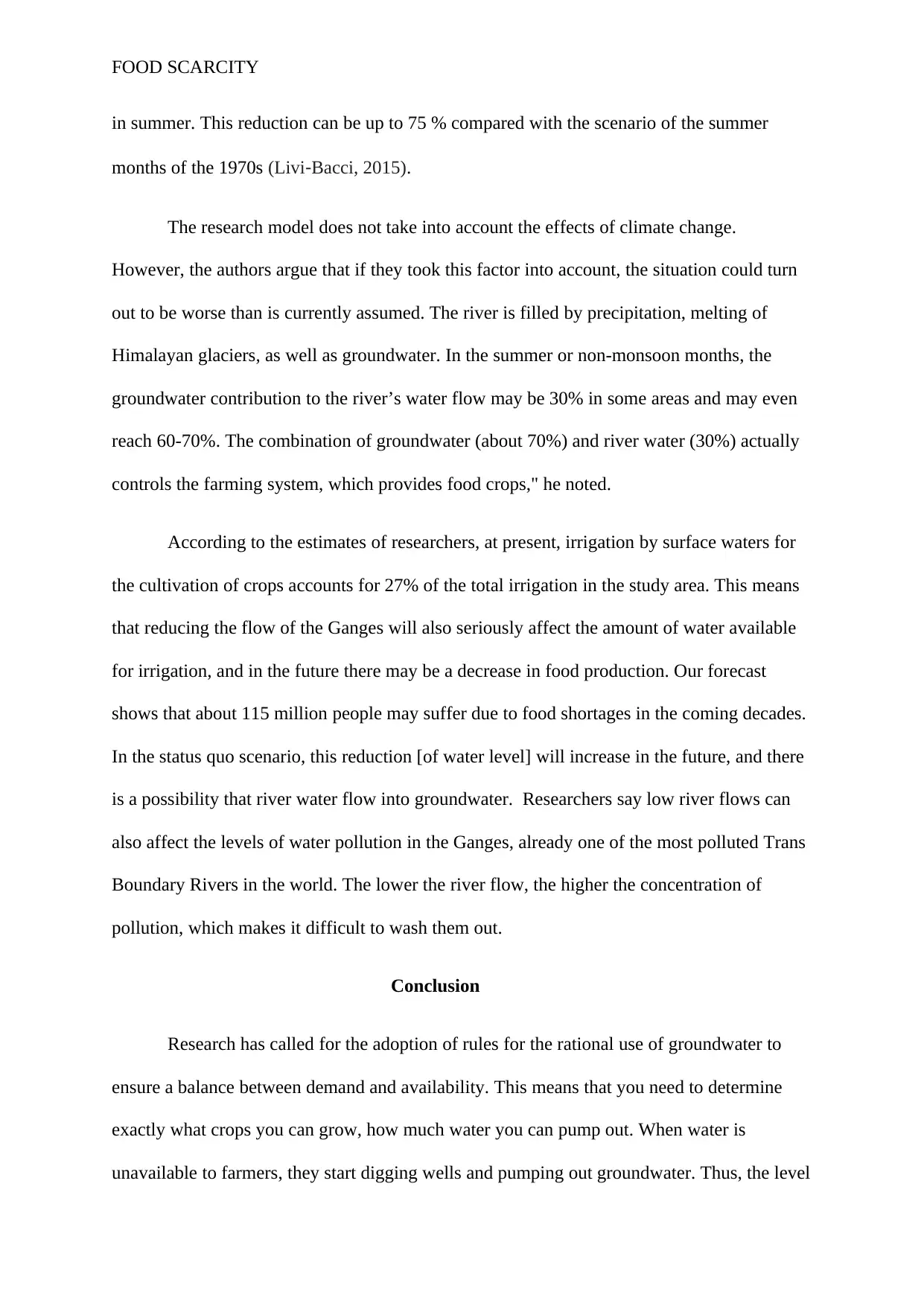
FOOD SCARCITY
in summer. This reduction can be up to 75 % compared with the scenario of the summer
months of the 1970s (Livi‐Bacci, 2015).
The research model does not take into account the effects of climate change.
However, the authors argue that if they took this factor into account, the situation could turn
out to be worse than is currently assumed. The river is filled by precipitation, melting of
Himalayan glaciers, as well as groundwater. In the summer or non-monsoon months, the
groundwater contribution to the river’s water flow may be 30% in some areas and may even
reach 60-70%. The combination of groundwater (about 70%) and river water (30%) actually
controls the farming system, which provides food crops," he noted.
According to the estimates of researchers, at present, irrigation by surface waters for
the cultivation of crops accounts for 27% of the total irrigation in the study area. This means
that reducing the flow of the Ganges will also seriously affect the amount of water available
for irrigation, and in the future there may be a decrease in food production. Our forecast
shows that about 115 million people may suffer due to food shortages in the coming decades.
In the status quo scenario, this reduction [of water level] will increase in the future, and there
is a possibility that river water flow into groundwater. Researchers say low river flows can
also affect the levels of water pollution in the Ganges, already one of the most polluted Trans
Boundary Rivers in the world. The lower the river flow, the higher the concentration of
pollution, which makes it difficult to wash them out.
Conclusion
Research has called for the adoption of rules for the rational use of groundwater to
ensure a balance between demand and availability. This means that you need to determine
exactly what crops you can grow, how much water you can pump out. When water is
unavailable to farmers, they start digging wells and pumping out groundwater. Thus, the level
in summer. This reduction can be up to 75 % compared with the scenario of the summer
months of the 1970s (Livi‐Bacci, 2015).
The research model does not take into account the effects of climate change.
However, the authors argue that if they took this factor into account, the situation could turn
out to be worse than is currently assumed. The river is filled by precipitation, melting of
Himalayan glaciers, as well as groundwater. In the summer or non-monsoon months, the
groundwater contribution to the river’s water flow may be 30% in some areas and may even
reach 60-70%. The combination of groundwater (about 70%) and river water (30%) actually
controls the farming system, which provides food crops," he noted.
According to the estimates of researchers, at present, irrigation by surface waters for
the cultivation of crops accounts for 27% of the total irrigation in the study area. This means
that reducing the flow of the Ganges will also seriously affect the amount of water available
for irrigation, and in the future there may be a decrease in food production. Our forecast
shows that about 115 million people may suffer due to food shortages in the coming decades.
In the status quo scenario, this reduction [of water level] will increase in the future, and there
is a possibility that river water flow into groundwater. Researchers say low river flows can
also affect the levels of water pollution in the Ganges, already one of the most polluted Trans
Boundary Rivers in the world. The lower the river flow, the higher the concentration of
pollution, which makes it difficult to wash them out.
Conclusion
Research has called for the adoption of rules for the rational use of groundwater to
ensure a balance between demand and availability. This means that you need to determine
exactly what crops you can grow, how much water you can pump out. When water is
unavailable to farmers, they start digging wells and pumping out groundwater. Thus, the level
Paraphrase This Document
Need a fresh take? Get an instant paraphrase of this document with our AI Paraphraser
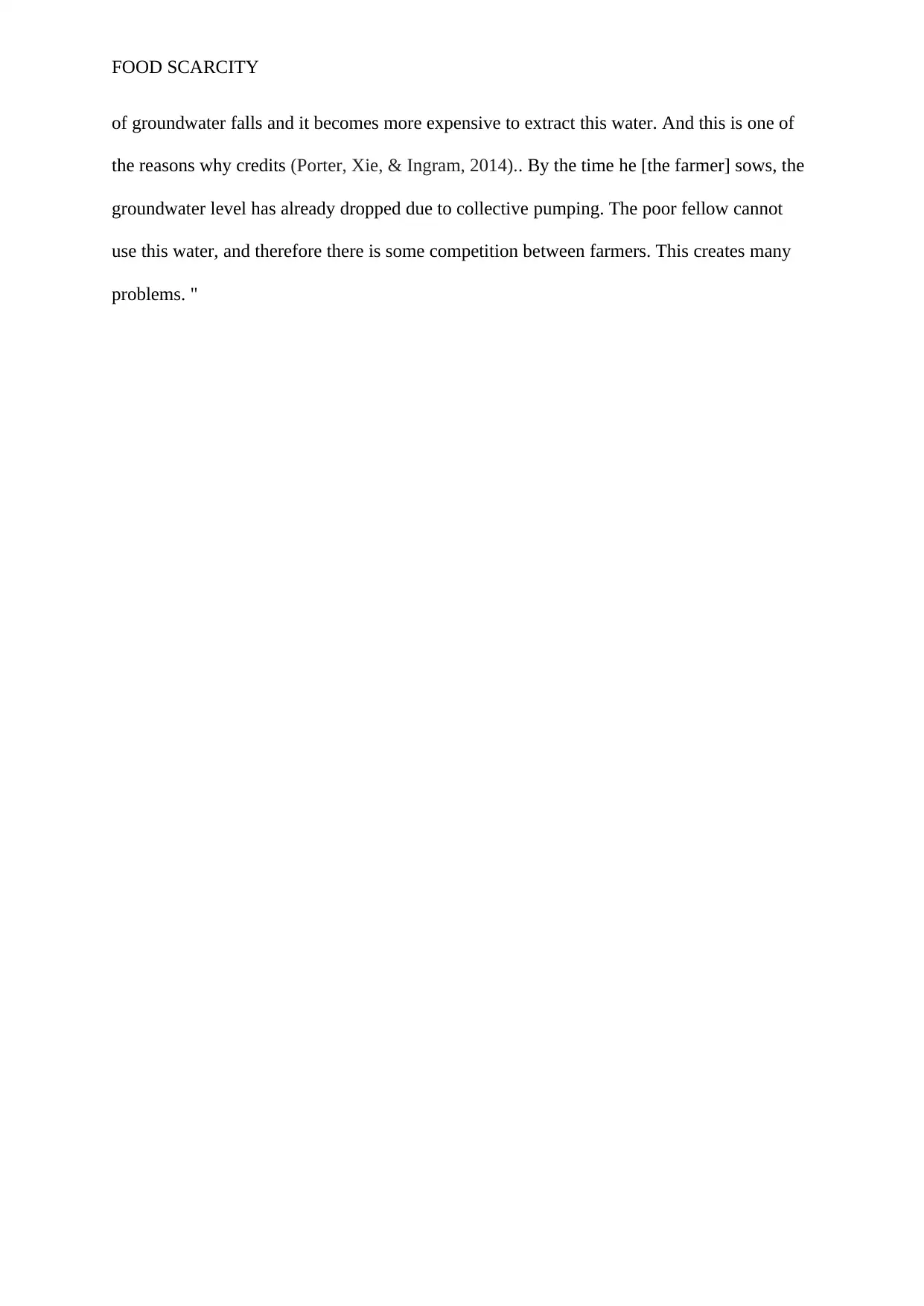
FOOD SCARCITY
of groundwater falls and it becomes more expensive to extract this water. And this is one of
the reasons why credits (Porter, Xie, & Ingram, 2014).. By the time he [the farmer] sows, the
groundwater level has already dropped due to collective pumping. The poor fellow cannot
use this water, and therefore there is some competition between farmers. This creates many
problems. "
of groundwater falls and it becomes more expensive to extract this water. And this is one of
the reasons why credits (Porter, Xie, & Ingram, 2014).. By the time he [the farmer] sows, the
groundwater level has already dropped due to collective pumping. The poor fellow cannot
use this water, and therefore there is some competition between farmers. This creates many
problems. "
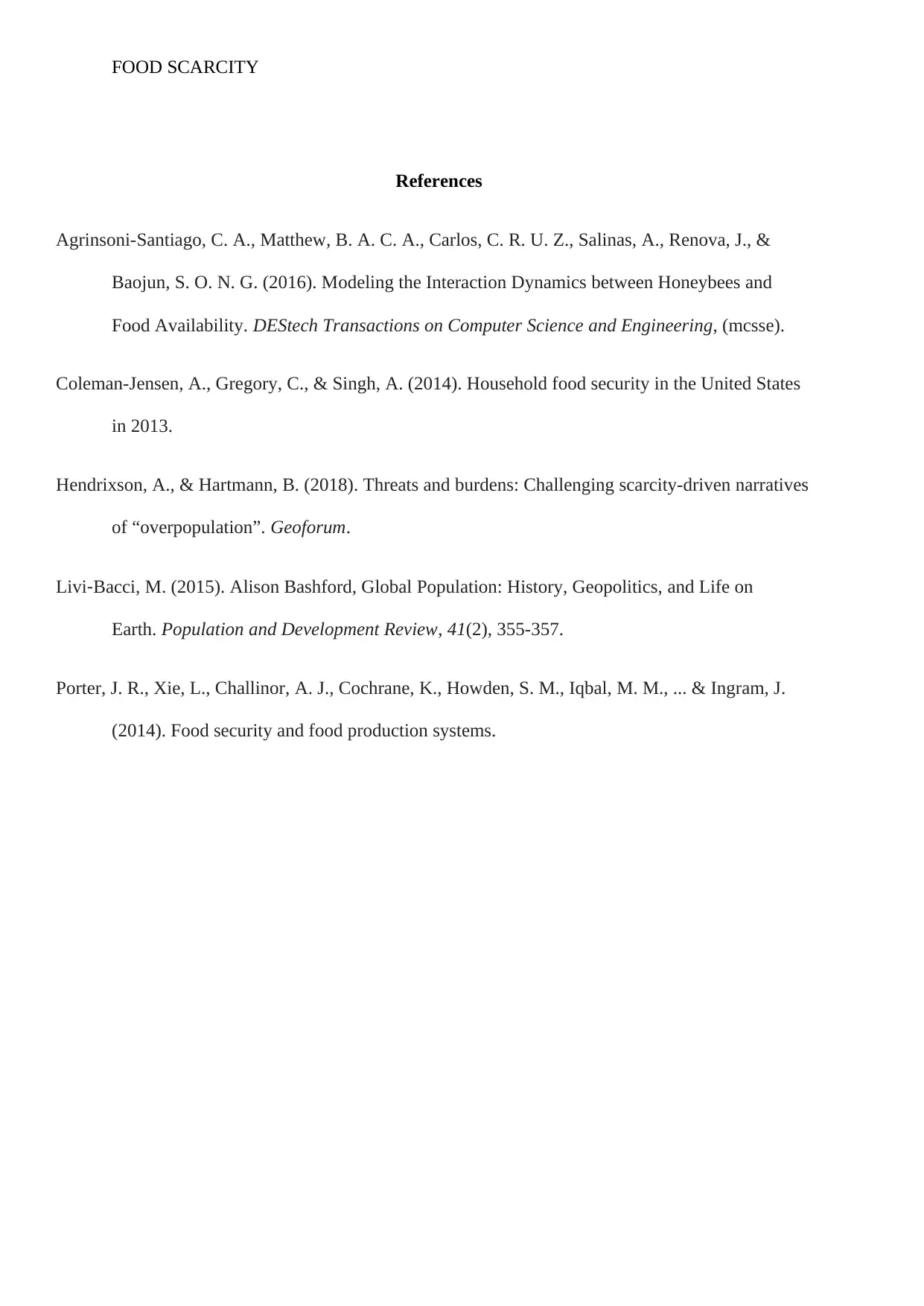
FOOD SCARCITY
References
Agrinsoni-Santiago, C. A., Matthew, B. A. C. A., Carlos, C. R. U. Z., Salinas, A., Renova, J., &
Baojun, S. O. N. G. (2016). Modeling the Interaction Dynamics between Honeybees and
Food Availability. DEStech Transactions on Computer Science and Engineering, (mcsse).
Coleman-Jensen, A., Gregory, C., & Singh, A. (2014). Household food security in the United States
in 2013.
Hendrixson, A., & Hartmann, B. (2018). Threats and burdens: Challenging scarcity-driven narratives
of “overpopulation”. Geoforum.
Livi‐Bacci, M. (2015). Alison Bashford, Global Population: History, Geopolitics, and Life on
Earth. Population and Development Review, 41(2), 355-357.
Porter, J. R., Xie, L., Challinor, A. J., Cochrane, K., Howden, S. M., Iqbal, M. M., ... & Ingram, J.
(2014). Food security and food production systems.
References
Agrinsoni-Santiago, C. A., Matthew, B. A. C. A., Carlos, C. R. U. Z., Salinas, A., Renova, J., &
Baojun, S. O. N. G. (2016). Modeling the Interaction Dynamics between Honeybees and
Food Availability. DEStech Transactions on Computer Science and Engineering, (mcsse).
Coleman-Jensen, A., Gregory, C., & Singh, A. (2014). Household food security in the United States
in 2013.
Hendrixson, A., & Hartmann, B. (2018). Threats and burdens: Challenging scarcity-driven narratives
of “overpopulation”. Geoforum.
Livi‐Bacci, M. (2015). Alison Bashford, Global Population: History, Geopolitics, and Life on
Earth. Population and Development Review, 41(2), 355-357.
Porter, J. R., Xie, L., Challinor, A. J., Cochrane, K., Howden, S. M., Iqbal, M. M., ... & Ingram, J.
(2014). Food security and food production systems.
⊘ This is a preview!⊘
Do you want full access?
Subscribe today to unlock all pages.

Trusted by 1+ million students worldwide
1 out of 6
Your All-in-One AI-Powered Toolkit for Academic Success.
+13062052269
info@desklib.com
Available 24*7 on WhatsApp / Email
![[object Object]](/_next/static/media/star-bottom.7253800d.svg)
Unlock your academic potential
Copyright © 2020–2025 A2Z Services. All Rights Reserved. Developed and managed by ZUCOL.